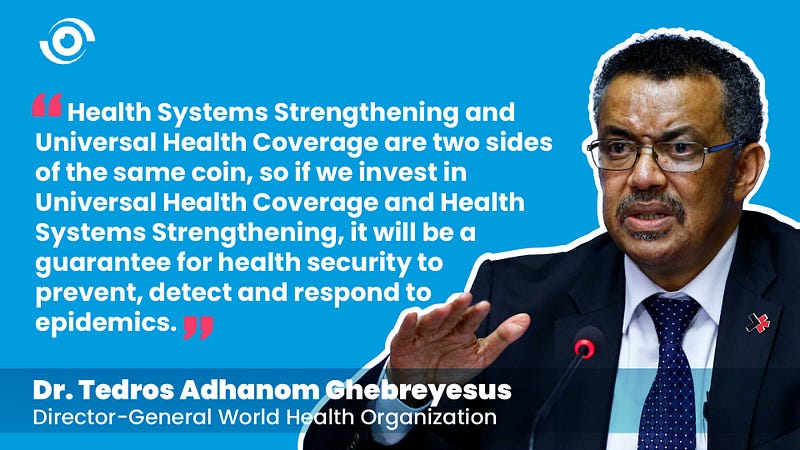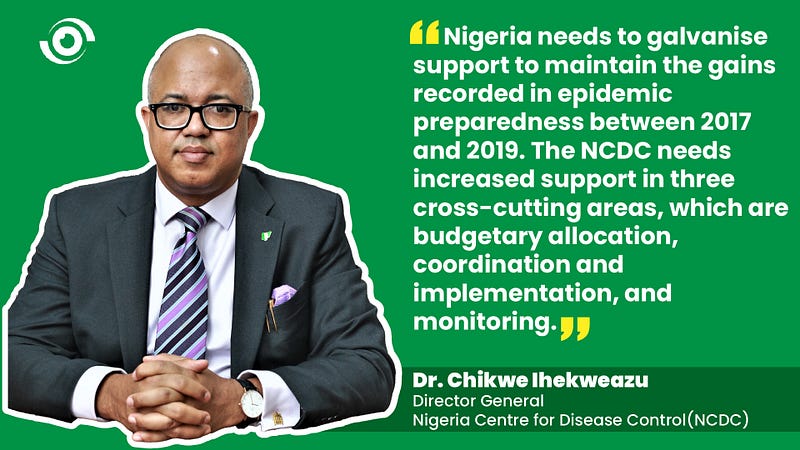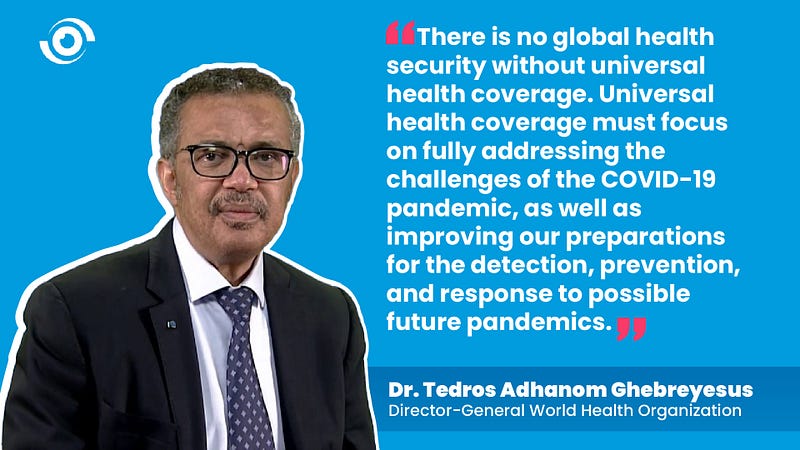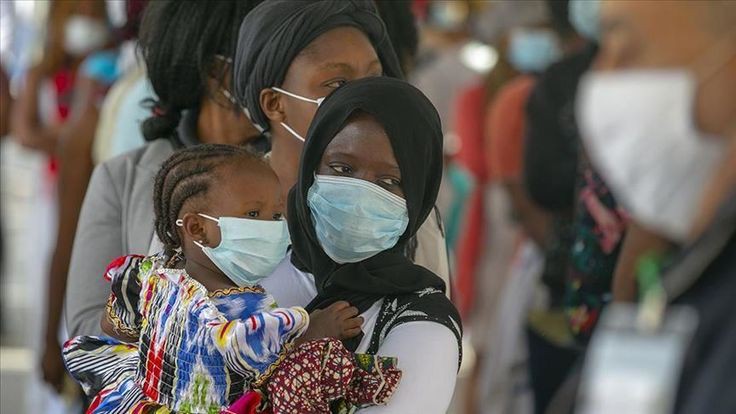Gabriel Oke and Omodolapo Shobowale (Lead Writers)
On April 8, 2018, Dr Tedros Adhanom Ghebreyesus, the Director-General of World Health Organisation (WHO) affirmed the linkage between Universal Health Coverage (UHC) and global health security as two sides of the same coin in an interview with Nigeria Health Watch. ‘‘Health Systems Strengthening and Universal Health Coverage are two sides of the same coin so if we invest in Universal Health Coverage and health systems strengthening that will be a guarantee for health security to prevent, detect and respond to epidemics,” he said.
His comments came 20 months before COVID-19 outbreak began in Wuhan, China. As a result of the pandemic, the health systems of various countries globally have been overwhelmed. To underscore the prominence of quality healthcare, huge amounts of resources are being expended on research to develop vaccines, buy personal protective equipment, and improve health systems during the COVID19 pandemic.
Taking Nigeria as an example, COVID-19 has exposed numerous gaps in Nigeria’s health system as it was only after the COVID19 outbreak that a lot of diagnostic laboratories were strengthened for testing. A Chatham House article argued that increased investments by the government in the health sector would make Nigerians have better trust in the ability of the government to deliver quality healthcare. When this is done people will trust the government to deliver on other promises and also only healthy people can partake in National development.

When Nigeria’s 2019 Joint External Evaluation (JEE) rating was made public, NCDC Director-General, Dr. Chikwe Ihekweazu, said, “Nigeria needs to galvanise support to maintain gains recorded in epidemic preparedness between 2017 and 2019. NCDC need support in three cross-cutting areas; increased budgetary allocation, improved coordination and implementation, and monitoring. The keys to improved budgeting are increased allocation, release, and tracking’’.
In a model that showed the vulnerability of the world to a pandemic in terms of economic loss, Nigeria fell in the red zone, which is a zone where a pandemic could wipe out more than 2% of gross domestic product. A strong health system, delivering healthcare to all is necessary to detect, prevent and respond to infectious diseases outbreaks.
In retrospect, the resources spent so far in responding to COVID19 could have been spent in ensuring that Nigeria is better prepared for infectious disease outbreaks. For instance, the rush to establish, accredit, and strengthen laboratories should have been done years back if epidemic preparedness and Universal Health Coverage had been made a priority. When the COVID-19 outbreak started, it became clear to people that the health system is probably the most important aspect of Nigeria’s economy. Therefore, funds and collaborations increased to tackle the outbreak. These investments and partnerships should have been in place before COVID-19 to address various health challenges facing the country like low coverage of health insurance as a lot of citizens still cannot afford to insure their health.

To mitigate the impact of the pandemic, most countries went into lockdowns. These lockdowns meant confining millions of citizens to their homes, shutting down businesses, religious centers, and stopping almost all economic activities. Although this wasn’t easy because many were adversely affected, most citizens complied. It has become clear to all countries that the battle to contain pandemics can only be won with better collaborations and communications. Achieving victory depends on everyone having access to healthcare.
Another outbreak that has occurred in Nigeria is Lassa fever. Nigeria was at a point under pressure to declare a national health emergency as it responded to the largest recorded outbreak of Lassa fever which killed 219 people in the country, according to NCDC. These infectious disease outbreaks have shown that healthcare should be our topmost priority as a country as everyone was scared to travel to endemic places when the daily record of infected cases in Nigeria was still high. Lack of physical interaction between people can reduce economic activities like buying and selling of goods and services especially in the local areas. The COVID-19 pandemic has adversely affected human to human interaction. These interactions are important for the growth of economies. This global health challenge has again reinforced the saying that “Health is Wealth”. Furthermore, the International Monetary Fund (IMF) has proposed that the global economy is expected to shrink by over 3 percent in 2020 — the steepest slowdown since the great depression of the 1930s.

Since the advent of the epidemic not only has the economy been affected but also the prevention and treatment services for other diseases. One of the aspects of healthcare that has been affected is the prevention and treatment of non-communicable diseases (NCDs). For example, a recent WHO survey carried out in 155 countries confirmed that the impact of COVID-19 on prevention and treatment of NCDs is global and low-income countries are most affected. Meanwhile, people living with NCDs are at higher risk of severe COVID-19-related complications and death. Many people who need treatment for diseases like cancer, cardiovascular disease, and diabetes have not been receiving health services and medicines effectively since the COVID-19 pandemic began. Countries must find innovative ways to ensure that essential services for the management of other diseases continue, even as they fight COVID-19 and future pandemics. Rehabilitation services have also been disrupted in almost two-thirds (63%) of countries, even though rehabilitation is key to a healthy recovery following a severe illness from COVID-19.
With the daily record of new cases reducing, the ban on international travel has been relaxed with public health safety measures put in place. Nigeria must learn from the impact of the pandemic on lives, businesses and economies and prioritise investments in moving the nation towards universal health coverage.
The WHO Director-General is right — there is no global health security without universal health coverage. Universal Health Coverage is central to enable detection, prevention, and response infectious diseases outbreaks.
In what other ways can Nigeria increase investments into the health sector? Let us know in the comment section below, or on Twitter @nighealthwatch or Facebook @nigeriahealthwatch



This is a very well written piece.